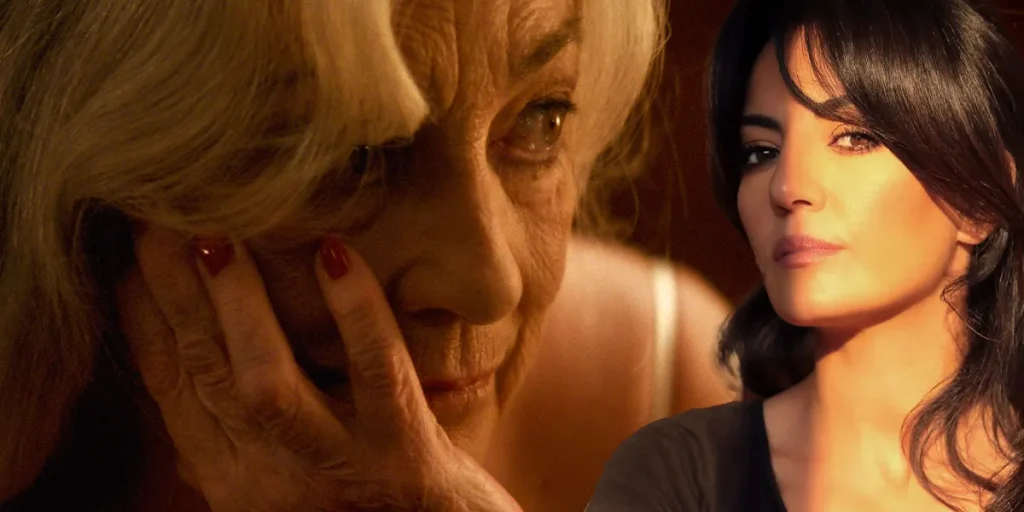At the Venice Film Festival, we interview writer-director Maryam Touzani about Calle Malaga, its protagonist and themes, working Carmen Maura, and more.
The 79-years-old María Ángeles (Carmen Maura) lives a happy life in Tangier, northern Morocco, a place she belongs to in an almost visceral way. One day, her carefully curated routine is put to the test when her daughter Clara (Marta Etura), who lives in Spain, shows up at her door. Clara has decided to sell María Ángeles’s apartment in Calle Malaga, which leaves our protagonist with very few choices. Until she remembers that this is her own story, and she’s still in charge.
Calle Malaga, which has just won the Audience Award at the Venice Film Festival, is the empowering, empathetic tale of a woman who refuses to be anything but herself. It’s a movie about identity and self-worth, but it’s also about grief, and most of all, love. At the World Premiere of the film in Venice and ahead of its North American Premiere at TIFF, we spoke with writer-director Maryam Touzani (The Blue Caftan) about how the film was “born out of pain,” the generational story at its core, its protagonist and themes, working with Carmen Maura, her writing process and collaboration with Nabil Ayouch, and more. Read the interview below!
A Film that Was Born Out of Pain: How the Story of Calle Malaga ‘Emerged’
Thank you so much for this incredible film! I am such a fan of The Blue Caftan, but this film reached me on a completely different level. How did it all start? Where did this story come from?
Maryam Touzani: It’s a film that was born out of pain, out of loss. It started because I lost my mom. When I finished The Blue Caftan, she didn’t have the chance to see it: [she died] just before it premiered. My mom and I were very, very close. She died very suddenly, from one day to the next: it was completely unexpected, and I was devastated. I wrote this film out of the need to continue speaking to her.
My mom was half Spanish. She and I always used to speak Spanish in the house: it was the language that we had between us, and she was the only person I used to speak Spanish to on a daily basis. When she passed, I continued speaking to her in my head. Then, of course, there’s everything that remains: the memories, the objects, and all these things that are beautiful, but also very painful, at the same time. And then there was the need to smell the things she used to cook for me, just so I could still be with her.
That’s how it really started. Then, all that mingled with the memories of my grandmother as well, who was Spanish. When I was born, she was living in my parents’ house, and I was very close to her. We were really like a trio, the three of us. So everything got mixed up, and hist character of María Ángeles emerged in my head unconsciously: when I write, it’s always something that just takes over. There isn’t a logic to it. I never say, “I’m going to write this story”. The story and the characters just come, and they impose themselves, and this is really how it began.
You can feel this grief in the story as you watch. Listening to you talk about your mother and grandmother reminds me of this scene in the film where María Ángeles is giving a pot away. Her daughter Clara sees that and tells her, “era de la abuela” (“it was grandma’s”), to which María Ángeles replies “era de mi abuela” (“it was my grandma’s”). You can definitely feel that Calle Malaga is a generational story.
M.T.: Yeah, because I think that, sometimes, there are things us younger generations are not aware of, and that we miss out on. For María Ángeles, this kind of ‘transmission’ is a very important thing. The pot that you see in the film was actually my great grandmother’s. I think it’s very beautiful to keep this link [with the people in your family]. It’s a way of keeping the people you love alive through these objects that are passed down [through generations]. Clara doesn’t understand this: she’s from another world, and she has other preoccupations. She doesn’t even realize that it’s actually her great grandmother’s, and not her grandmother’s; Clara and María Ángeles are at two different points of their lives in that moment. I think, sometimes, it’s just important to take a step back and question certain things.
I also really love that there are things you hint at but don’t really tell us about. For example, all we know about Clara’s childhood is that she ran away from home when she was a teenager, but we can imagine the rest. There’s this whole world behind every single character you write.
M.T.: I think it’s important to not necessarily say everything. Clara left when she was very young, and I didn’t necessarily want to get into the reasons why she didn’t come back so often. I think it’s important to have the characters exist outside the screen: they have a life outside what we’re being told, and we can imagine a part of what has taken them to the point where we meet them in the film.
Calle Malaga‘s Protagonist: Maryam Touzani on María Ángeles
I’d like to ask you about María Ángeles, particularly the way she challenges gender roles in Calle Malaga. Take a football scene in the movie, where she stops a fight in her apartment: she takes charge in a way that’s completely her own. She doesn’t need to be rescued, and more than that, she already knows who she is. This is really quite new, and wonderful to see.
Maryam Touzani: Thanks for being sensitive to that: this [aspect] was very important to me [when I was writing the film]. María Ángeles is exactly the way you described her. She doesn’t need anybody to save her. She has the strength of character it takes to deal with a room full of fifty guys. If they’re fighting, it doesn’t matter; she’ll put an end to that fight. I find women like that so inspiring; I guess that, on some unconscious level, that’s the reason why she has the personality that she has in the film. I really wanted a woman who was going to take her life in her own hands and make her own decisions, but also become more aware of her own strength when she’s put in this situation.
Her daughter tells her, “You’ve never really worked”. María Ángeles has had a job, but she hasn’t struggled as much as her daughter, because it’s a different generation. Still, she has what it takes, and if she needs to get up and [break up a fight], she’ll do it. I also wanted María Ángeles to discover the strength that she has in her as the film advanced, and at an older age: to me, age is just a number, and you can discover, or re-discover, things about yourself at any time in your life.
And life is so full of surprises. She never expected her life to be taken away from her the way it was. She could have just just laid low and said, “Okay, well, this is my destiny”. But she realizes that she’s still breathing, she’s still alive, and she still feels things. That’s enough of a ‘motor’ to make her get up and fight. I like female characters who won’t let themselves get subdued, and who’ll put up a fight. I believe that this is what our life is made of.
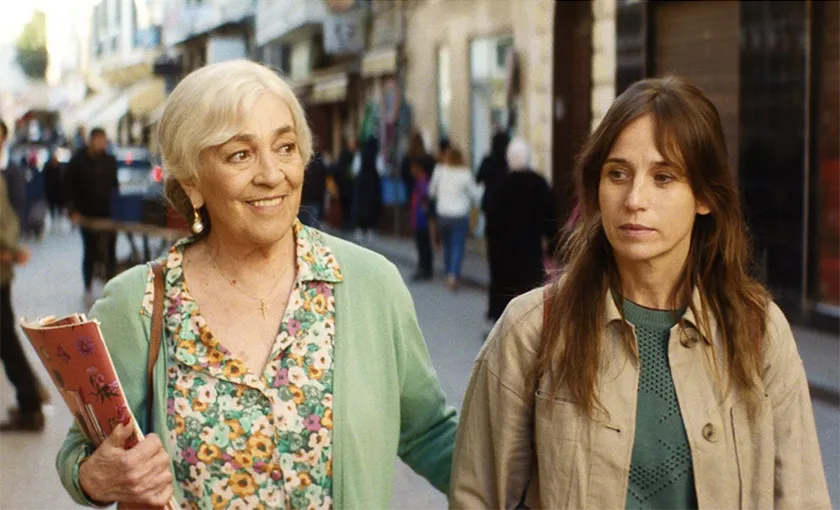
I love the way you and cinematographer Virginie Surdej filmed her as well. There are all these sequences where you’re tracking her, but from the front, and you always focus on her face. This makes us so immersed in the story.
M.T.: That’s the kind of feeling I wanted to get: I wanted to really be under her skin, and to feel what she’s feeling. I wanted to be in the souk with her, and with her merchants, outside; to go into her house with her once it’s empty; to feel her in this journey at this moment of her life, but to really be inside with her. I’m happy you were sensitive to that.
I was almost physically hurt whenever María Ángeles was unhappy in the film! For example, there’s a scene where she’s put into a home and they really want to cut her hair, but she refuses. Her hair is such an important element to the film, even later on.
M.T.: Yeah. I grew up very close to this Spanish community. My grandmother and all her Spanish friends used to go to this old people’s house – the one that you see in the film – when I was younger, to visit friends that had ended up there. A lot of times – most of the times, actually – her friends ended up cutting their hair very short when they got older.
But my grandmother kept her long white hair. She’d put it up in a bun, but in the house, it was always down. As a little girl, I always found that so beautiful. She’d take care of herself and have her hair long, and she’d never really fit into that ‘box’ 100%. There’s something for me in that scene that’s very important: it’s as if they wanted to take away María Ángeles’s femininity because she’s reached a certain age where you no longer need to be attractive. The woman at the home says it’d be much simpler to take care of.
But who’s talking about simple? If you’re happy with the way you look, and with your long hair, you shouldn’t be expected to abandon certain things just because they no longer fit what people expect of you. There are these expectations about old age – about the way we should dress and act, what we should do, and about our sexuality, of course: what we can do, and what is not respectable anymore. I really wanted her to break all these boundaries and to just free herself from everything. When she rejects this woman cutting her hair, it’s the moment where she really takes consciousness of the fact that she is in this old people’s house, and that she’s not the woman that they want her to be. She is what she is. She is alive. For me, it’s a turning point.
Her clothes reflect this too, don’t they? The way she’s always dressed in these colorful, flowery clothes.
M.T.: She’s very flowery and colorful, and there’s something very happy about the way she dresses. I always thought of her that way because I always imagined her as someone who’s very full of life. Red is the color that travels across the film, for some reason. It was there from the very beginning, and I think it’s because I find there to be something very crude, very raw about the color red. It can be sometimes violent, but it’s still so alive. I always identified her with red.
“I’d cry a lot, but I’d laugh a lot too.” – Where María Ángeles Took Maryam Touzani as she wrote Calle Malaga
I love that María Ángeles is not a saint. To me, she feels like a sort of ‘cowboy’ hero: she has this very strong moral code that not everyone might agree with, but to her, it feels right. She even starts blackmailing an estate agent at some point! Please tell me more about that scene and how you played with genres: it feels like it should belong in a supernatural horror movie, with the way you initially frame it.
Maryam Touzani: Yeah, she’s basically like a chief of police [in that scene]: she’s the one in power. What’s interesting for me there is that she realizes that this is her chance to take this opportunity to switch things around, and she’s going to have to play the bad cop and say, ‘Listen, It’s going to go by my rules.’ And I think she takes pleasure in doing that. There are these little things that, little by little, make her have even more confidence in her decisions, and in what she’s doing. I had a lot of fun with her as I was writing, and experiencing these things with her. I’d laugh a lot with her. I’d cry a lot, but I’d laugh a lot too.
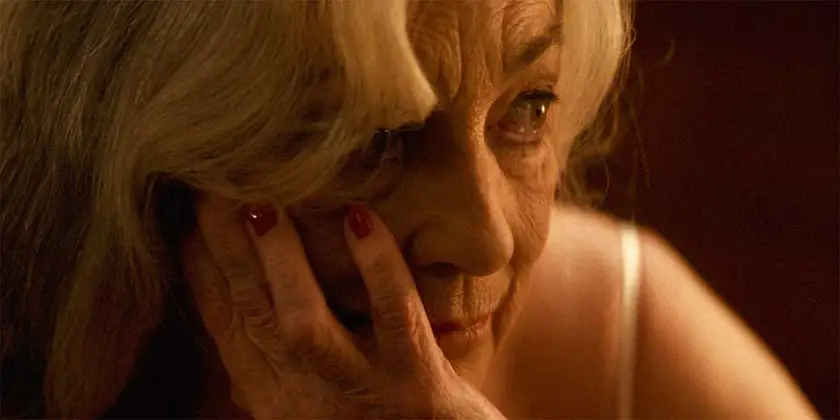
It’s the same experience as you watch the movie! And speaking of laughing, the nun – María Ángeles’s friend, to whom she confesses all her secrets because she’s taken a vow of silence and can’t tell anyone – is incredible! The humor is so on point.
M.T.: I really needed to laugh as I was writing this film. I never consciously thought about this as I was writing, but since this was a way of facing the pain I was feeling inside, I think that I really needed to laugh once in a while. When I’d close my eyes at night and I’d go [to places] with María Ángeles, sometimes it’d be fun, and she’d make me forget things. I never know where a character is going to take me, when I write, but she really responded to something that I was feeling very deep inside.
Where did the character of the nun come from?
M.T.: My grandmother was Catholic, and she had a lot of nun friends. There was this one place we used to go to, in Tangier – where I’m from – where there were these silent nuns; I was a little child, and I was always so intrigued by them. I used to look at them and wonder what their life was like, what they thought about, and all that was going on in their heads. That’s how this character just came out of the blue in the film.
Maryam Touzani on Carmen Maura
Carmen Maura is so good in this film! There’s a scene at the start, where Clara tells María Ángeles that she had an estate agent come see the house, and she turns around. Carmen doesn’t even need to say anything for us to feel all the rage, the sadness, but also the love. She is so perfect for this role. What was your collaboration with Carmen like?
Maryam Touzani: When I met Carmen, I fell in love with her. There is this freshness about her, this joie de vivre, this energy: she’s almost eighty years old, but she’s still like a little girl sometimes.
I think it’s beautiful that you can be all these things at the same time; that was very present with Carmen. This was a very intense role for her: she’s in every single scene of the film except for one – the one where Clara is on the rocking chair. But otherwise, she’s everywhere. It’s not a mean feat. But Carmen is very open to challenges, and she has this energy.
Take the love scenes, where María Ángeles takes off her clothes. At that age, it’s something that’s just not very easy for a woman, but what I feel is very beautiful is that, for María Ángeles, it meant making a statement. She’s saying, ‘Well, I’m 80, and I’m free.’ I’m free to do what I want: if I want to show my naked body, I’ll show my naked body. That’s something that I think is beautiful in Carmen as well: she has this courage to be whoever she wants to be, and do the things she wants to do. Of course, there’s a certain maturity that comes with age, but I think it’s also a force of character that she has that makes it very interesting to work with her.
Did you know Carmen was going to play María Ángeles when you wrote the film?
M.T.: Not when I wrote it, but I knew it immediately when I met her.
What was that meeting like?
M.T.: The first time we spoke, I felt there was something so natural in her [that reflected] the María Ángeles I had imagined. It’s this joie de vivre, but there was something a little bit mischevous about her that I feel worked so well with the character, because María Ángeles is a little bit like that as well. And she completely fell in love with the character when she read the script!
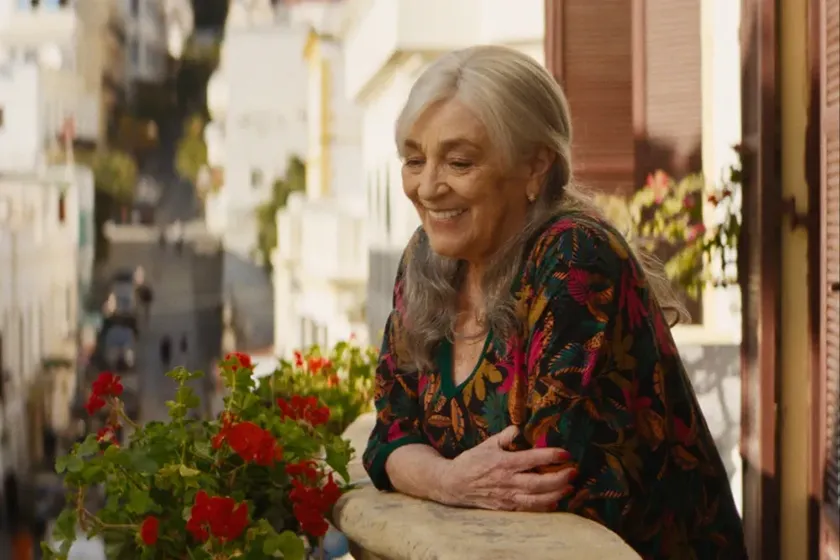
“Toda una vida me estaría contigo“: Rebirth and Our Relationship to Objects in Calle Malaga
You found the perfect song for the film: “Toda Una Vida,” from María Dolores Pradera. I love that it’s there from the very start, and it comes to mean different things as the film goes on. Is there a special reason why you chose it?
Maryam Touzani: This is a song that my grandmother used to listen to. She loved María Dolores Pradera. I love this woman’s voice: the strength, the character, the maturity that there is in her voice. I’ve always loved that. I hadn’t listened to it for quite a long time, but somehow it came back naturally in my head, and then it wasn’t leaving me anymore. Because I think it sums up the film, somehow.
At different moments of the movie, it tells different things. There’s this very complex relationship between María Ángeles and her daughter, which is still alive. She says, “Toda una vida – All my life, I would care for you.” But this relationship is made of desperation, and of pain as well. And at the same time, María Ángeles wants to cherish this love for her own sake, and for her daughter’s sake too. Then, there’s obviously, “Toda una vida”, which is her house. These are her souvenirs, and this is a place she’s been in all her life: it’s a whole life that’s being taken away from her.
There’s also a new life she’s starting to discover, with her self-discovery and her romance with Abslam as well.
M.T.: Absolutely. To me, it’s really about rebirth. It’s about a constant rebirth to life: you’re reborn at the age of 70, or 80 even, and it’s about what you make of the things that life gives you. María Ángeles could have just laid low and stayed in this old people’s house, but she decides to do something else. Then, thos “otra vida” (“other life”) comes, which was in her. For me, it’s really about a constant rebirth – a rebirth to love as well, to her sexuality. As long as we’re alive, our “vida” still goes on and on.
I also wanted to ask you about María Ángeles’ love interest, Abslam, who is an antique dealer. He reminded me a lot of The Blue Caftan, particularly in a scene where he’s very carefully fixing a book. What is it that draws you to these kinds of ‘manual’ jobs?
M.T.: That’s a good question. It’s true: I’m always drawn to people that do manual jobs. I think that there’s something very beautiful in the link that’s created between a person and an object that they’re working on. There’s something intimate that you don’t necessarily find in other jobs, and it’s something I really admire, I guess.
Abslam is an antique dealer, but the thing that brings [him and María Ángeles] together is that he has a relationship to objects as well: he cares about them. She has her own relationship to her objects, but the fact that he cares about these objects, and he’s not just a guy who wants to sell stuff to make money… It makes her realize that there is this depth to him that she didn’t know about. It gives her this curiosity to discover who this man really is, beyond what she expected or her initial opinion of him. For me, it’s in this moment when she sees him mending this book that she realizes, ‘Okay, there’s something more to this guy.’
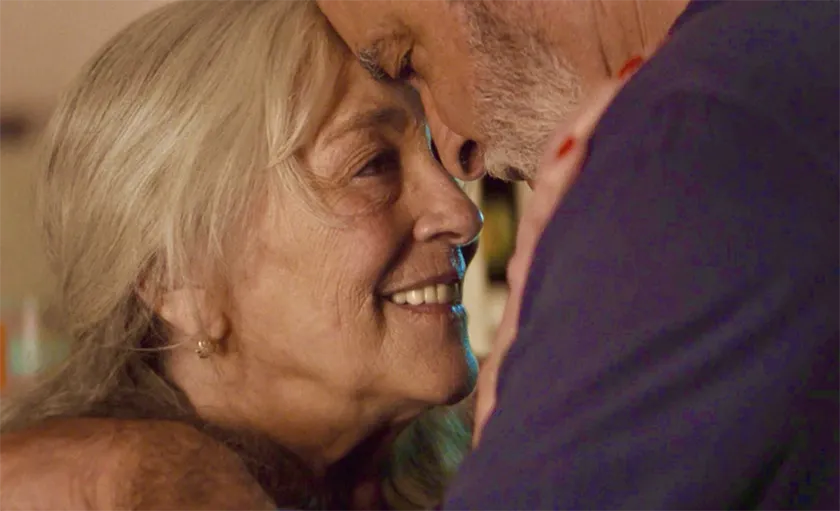
Maryam Touzani’s Relationship with Nabil Ayouch
I know you and Nabil Ayouch often write together and collaborate on each other’s films. Can you tell us more about how you work with each other?
Maryam Touzani: Well, it depends. There are films that we co-write completely, like Razzia (2017). Then there are films like Calle Malaga or The Blue Caftan, or films of his, like Casablanca Beats (2021), where he’ll write his scripts and I’ll write my scripts, but he’ll read my scripts and I’ll read his scripts, and we’ll collaborate in each other’s writing in the sense that we’re going to talk about the characters and the story. He’ll share his opinion and insight with me, and we’ll talk about the characters: that’s really how we collaborate.
I think it’s very important to have somebody to share what you’re writing with – somebody that you trust, and who knows you very well; somebody who is sometimes going to ask you questions that you aren’t asking yourself because it might be painful, or for a lot of different reasons. It’s really beautiful, because I’d have my script, and then he’d be there for me, to talk about it and share his opinions – to accompany me in a way that’s very caring.
Writing can be lonely, and I am a very lonely writer. I’m really plunged in my script, and in my characters, and it’s always a very lonely journey for me. To be able to share this with him and have his reflections as well, is something that’s very beautiful. And we accompany each other in the same way when he’s writing his films. It feels very good.
Why Maryam Touzani Makes Movies and What’s Next
Why do you make movies?
Maryam Touzani: For me, it’s always been almost a matter of survival. I started making films when my dad passed, and ever since, I think I’ve needed to make films: I absolutely needed to express something that I could not suffocate. I think I also make films to transform things that I feel that are painful into something else. Each film has a different reason, but it’s always born out of a necessity. I think making films is necessary for me to be able to come to terms, and be at peace, with a lot of things. It always comes from something very deep that I need to express; if I didn’t express it, I think I would pop.
I think it’s probably why your films hit us so viscerally. Do you have any future projects that you can talk about?
M.T.: Yes! I’m going to be acting in Nabil’s next film, which we co-wrote. It’s our next project together, and I haven’t acted in a long time. I’ve also started writing my next film in my head: it’s starting to take shape. It’s starting to become something that I think about a lot.
I can’t wait to find out what it is! Thank you so much for speaking with us!
This interview was edited for length and clarity.
Calle Malaga had its World Premiere at the Venice Film Festival on August 29, 2025, in the Spotlight section. The film will be released in U.S. theaters on February 6, 2026, with its North American Theatrical Premiere at Film Forum.

